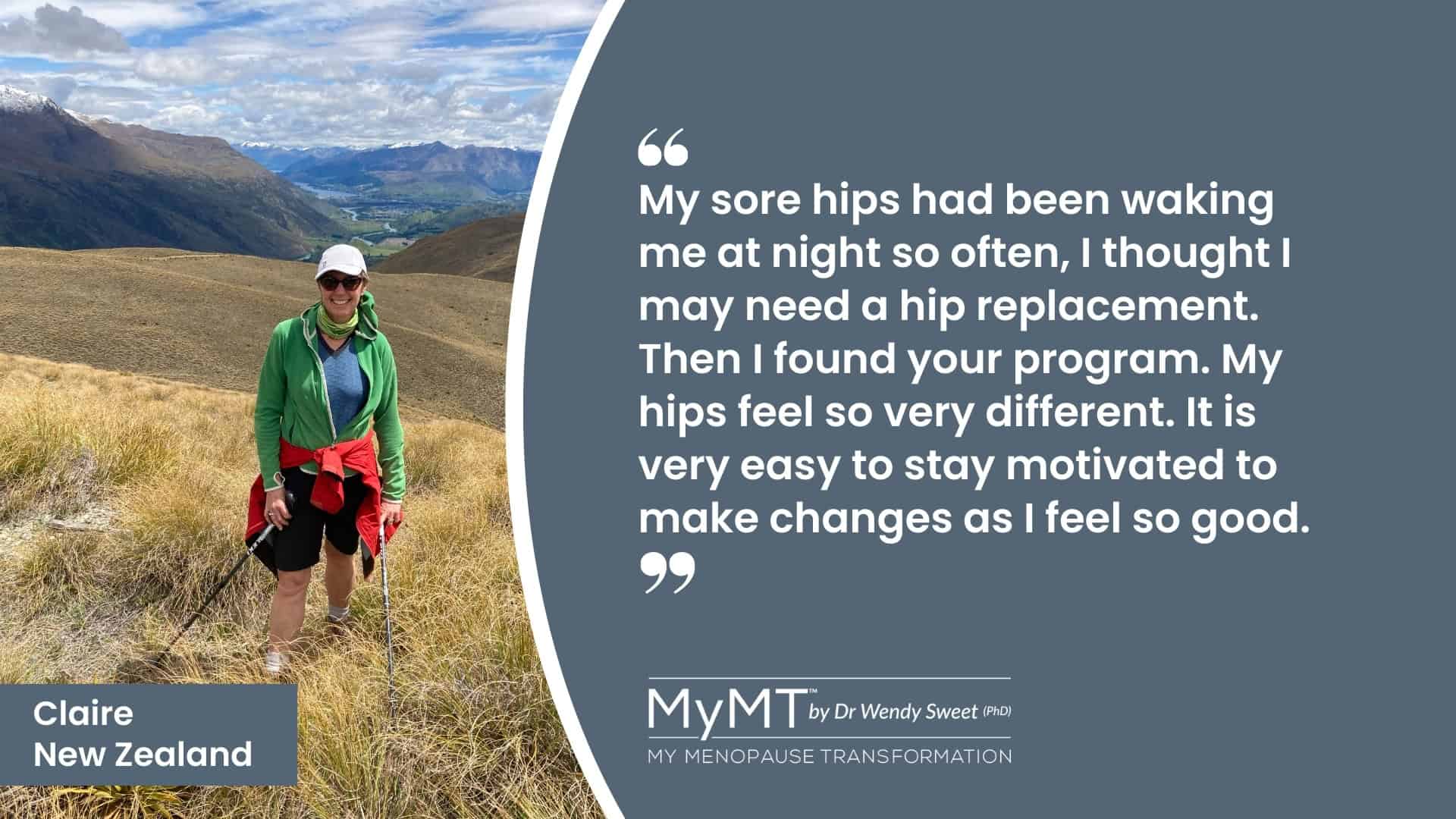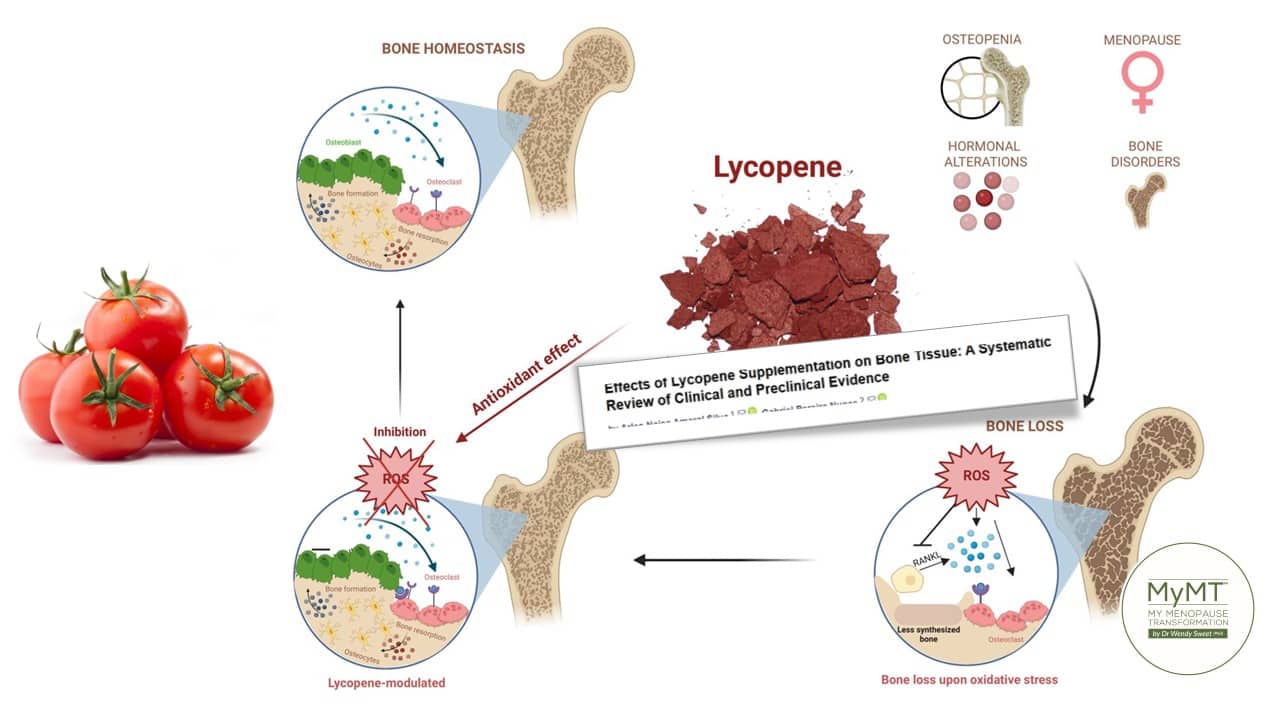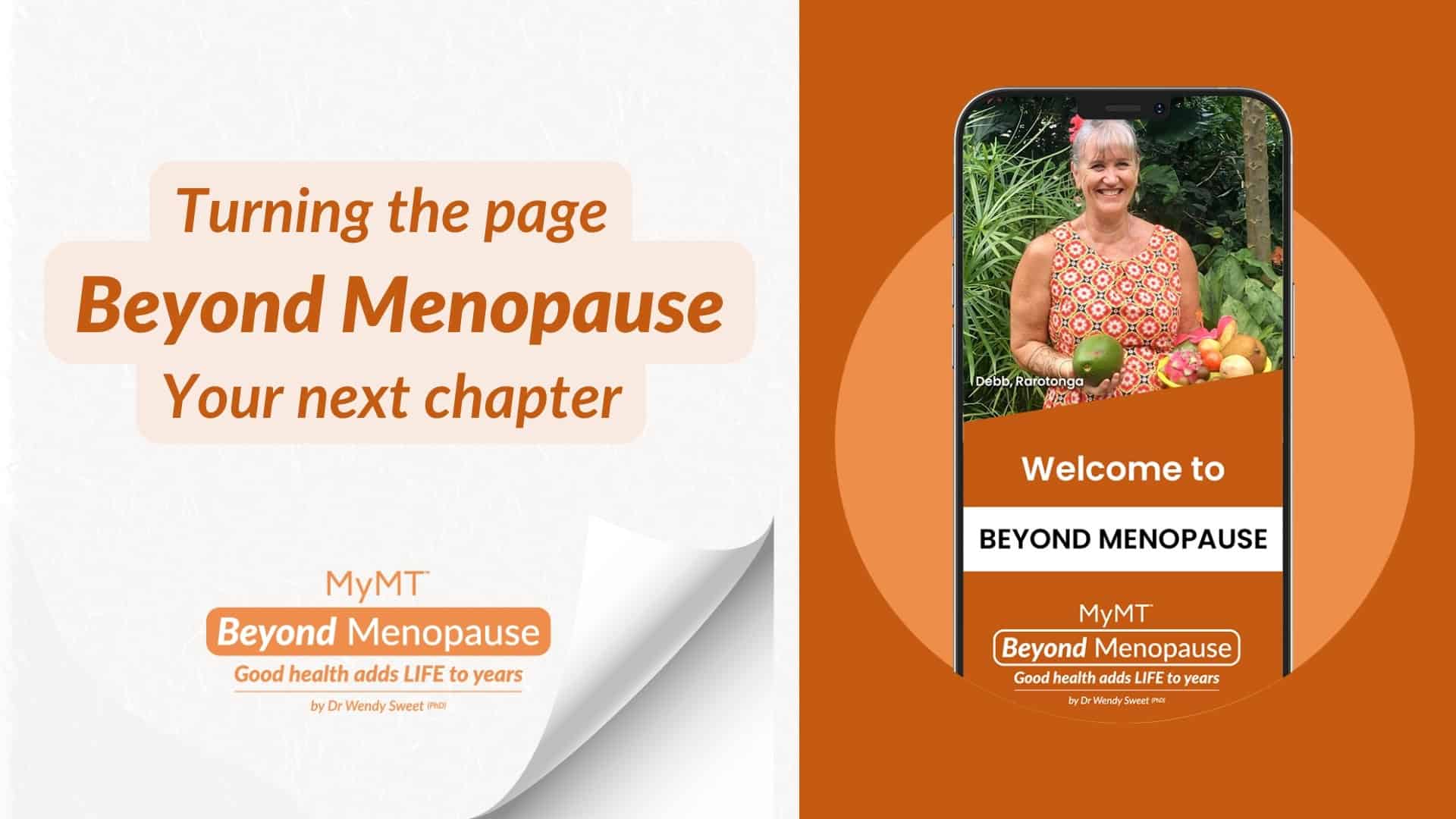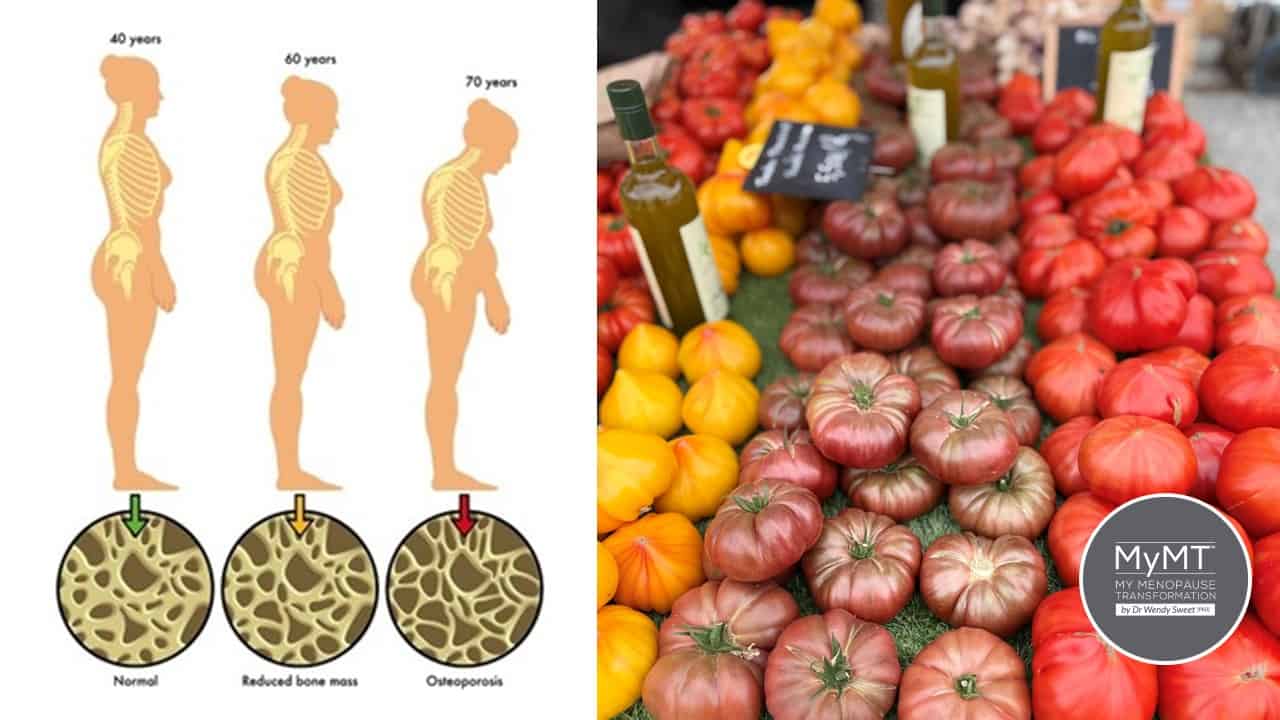It’s a disease known as the ‘silent thief’ and this food helps to turn it around!
My interest in lycopene, primarily from cooked tomatoes, was piqued, when I began to explore the role of this powerful compound on women’s cardiovascular health. Lycopene is a potent anti-oxidant and anti-inflammatory compound that isn’t produced in the body, so we need to obtain it from our food.
So, when new research emerged about the powerful role of lycopene on bone cells and osteoporosis prevention, I was excited for those of you who have noticed that your bone health has been changing with age.
As I teach women on my Beyond Menopause™ Programme, the emphasis on heavy weight training and high protein diets is a dominant theme in osteoporosis and sarcopenia prevention these days, but it’s not the only conversation.
In fact, for women who aren’t regular exercises, or are already overweight or obese, or aren’t sleeping, going directly to heavy weights and high protein may be detrimental to their health.

Risks associated with declining bone health aren't only due to menopause!
Osteoblasts and osteoclasts are the major cells involved in the development of osteoporosis.
As you may know, osteoporosis is a metabolic bone disease, with gradual loss of bone occurring over several years in men after the age of 60 and in women after the age of 50 years.
It is known as the ‘silent thief’, since there are usually no symptoms, until we have a DEXA scan, or have a fall and a fracture occurs.
Bone is a dynamic tissue.
It is continually renewing itself throughout life, with peak bone mass occurring around our mid 30s. Although peak bone mass starts to decline from our mid-30s and early 40s onwards, this decline may accelerate in all women due to these factors:
- Being too thin or having a current or past eating disorder
- Being a smoker
- Being low in Vitamin D and calcium intake
- Have a high intake of alcohol
- Drink more than 4 cups of coffee daily
- Undertake excessive and intense sport and exercise
- Have low antioxidant status
(Rao et al., Chap. 22, Aging & Oxidative Stress, Preedy & Patel (Eds), 2020].
These factors, either combined or individually, accelerate oxidative stress. This is the term given to the excessive production of reactive oxygen species (ROS), which damages cells and tissues in the body – bone included.
The good news is, however, that as we age and move through menopause, we can slow down the rate of oxidative damage, including in bones.
Whilst it’s important to maintain or build strength through adding some resistance to working muscles, it’s also important to consider the type of food that we eat for our bone health.
The push and pull of muscles on our bones, helps the bones to remodel, so I have specific exercises for women for their bone health in the MyMT™ Rebuild My Fitness programme and in my new Beyond Menopause™ programme which is designed for women in post-menopause. I also have brand new Food Guides and Recipes, specifically for women’s health, including bone health and these foods include lycopene!

Lycopene is a powerful antioxidant – we need it every day!
Epidemiological evidence in both human and animal studies indicates that ageing and the associated increase in reactive oxygen species (ROS) are responsible for bone loss as women age.
And as the menopause transition is now known as an inflammatory part of the life-course for women (McCarthy & Raval, 2020), it’s important to consider having a higher intake of antioxidants. An antioxidant is a compound that prevents damage from the effects of oxygen. Phytonutrients in certain plant-based foods are evidenced to offer anti-oxidant benefits.
Diseases associated with ROS, including osteoporosis, develop when antioxidants lose their fight against the cellular damage.
This is where lycopene-rich foods are beneficial to us.
Around 85% of North Americans obtain their dietary lycopene source from tomatoes – cooked and canned, but this powerful nutrient can also be obtained from watermelon, pink grapefruit and pink guavas (Preedy & Patel, 2020, p. 224).
To enhance its absorption, lycopene can also be taken with a-tocopherol (Vitamin E), a healthy fat, present in Extra Virgin Olive Oil.
This is the primary type of Vitamin E in extra virgin olive oil and approximately 2 milligrams of Vitamin E can be acquired from a tablespoon of olive oil, which is about 10% of the recommended daily intake of Vitamin E.
It’s no wonder that both EVOO and tomatoes are hallmarks of the Mediterranean diet, which has the most evidence for women’s health as they age. In the video below, I explain how the Mediterranean Diet is evidenced to reduce menopause symptoms and help women age healthily and how you can make the shift, with 5 easy changes.
How does Lycopene work to strengthen your bones?
Laboratory studies on lycopene suggest that when this compound is added to bone tissue in a laboratory setting, it stimulates cell proliferation and alkaline phosphatase activity.
Alkaline phosphatase (ALP) is a protein-based enzyme found in virtually all body tissues, including the liver, bones, intestines, and placenta.
This enzyme plays a significant role in bone health and lycopene helps in this role.
It is produced by osteoblasts (bone-forming cells) and involved in bone mineralization – the strengthening of your bones, as it helps to provide a high phosphate concentration for the bone matrix.
Lycopene helps to repair damaged or inflamed bone tissue.
When bone tissue is damaged or if inflammation is present, lycopene, in laboratory cultures and in studies on post-menopausal women, has been shown to repair this damage (Rao & Rao, 2003).
It achieves this by promoting bone formation. (Walallawita, 2020).

Join me for Beyond Menopause™ - your 12 week programme which women call 'life-changing'!
The Mediterranean Diet benefits the reduction of many diseases of ageing, including for women moving through menopause, osteoporosis prevention.
There are numerous compounds in foods promoted in this type of diet, including lycopene and epidemiological evidence supports the beneficial effects of tomatoes and tomato products in the prevention of osteoporosis in the Mediterranean population. (Pérez-López et al. 2009).
It’s why, in the Beyond Menopause™ programme (and my other 12 week programmes), I have a fabulous Food Guide and Recipe Book for you, with all the fabulous food information you need as you forget about your diets of the past and move into your healthy ageing years ahead.
I hope you can join me and the thousands of women globally who are making the time to focus on renewing their health, energy and vitality with MyMT™.

References:
Faustino R. Pérez-López, Peter Chedraui, Javier Haya, José L. Cuadros,
Effects of the Mediterranean diet on longevity and age-related morbid conditions. Maturitas, Volume 64, Issue 2, 2009. ISSN 0378-5122.
Rizzoli R, Bischoff-Ferrari H, Dawson-Hughes B, Weaver C. Nutrition and bone health in women after the menopause. Womens Health (Lond). 2014 Nov;10(6):599-608. doi: 10.2217/whe.14.40.
Sacco SM, Horcajada MN, Offord E. Phytonutrients for bone health during ageing. Br J Clin Pharmacol. 2013 Mar;75(3):697-707. doi: 10.1111/bcp.12033. PMID: 23384080
Silva, A. N. A., Nunes, G. P., Domingues, D. V. A. d. P., Toninatto Alves De Toledo, P., Akinsomisoye, O. S., Florencio-Silva, R., & Cerri, P. S. (2025). Effects of Lycopene Supplementation on Bone Tissue: A Systematic Review of Clinical and Preclinical Evidence. Pharmaceuticals, 18(8), 1172. https://doi.org/10.3390/ph18081172
Walallawita US, Wolber FM, Ziv-Gal A, Kruger MC, Heyes JA. Potential Role of Lycopene in the Prevention of Postmenopausal Bone Loss: Evidence from Molecular to Clinical Studies. Int J Mol Sci. 2020 Sep 27;21(19):7119. doi: 10.3390/ijms21197119. PMID: 32992481


